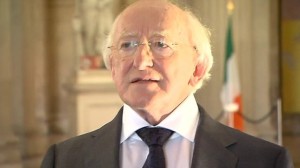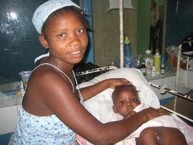
By Susan Gately - 18 January, 2014
 Hunger remains the “grossest violation of the most basic human right” and the single greatest moral challenge facing the global community in the 21st century, President Michael D. Higgins has warned.
Hunger remains the “grossest violation of the most basic human right” and the single greatest moral challenge facing the global community in the 21st century, President Michael D. Higgins has warned.
He made his comments as he accepted the Concern Worldwide / Fr Aengus Finucane Award for Services to Humanity at an award ceremony yesterday (17th January) at Áras an Uachtaráin.
The President said he received the award with gratitude and humility and he paid tribute to the founder of Concern, Fr Aengus Finucane, calling him a “truly inspirational figure”.
In 1980, President Higgins recalled that he was present when the the former German Chancellor, Willy Brandt, said that international development issues generated great hope as “a new century nears, and with it the prospects of a new civilisation.”
“Could we not begin to lay the basis for that new community with reasonable relations among all people and nations, and to build a world in which sharing, justice, freedom and peace might prevail?” Willy Brandt had asked.
Now we are well into that century, President Higgins commented, and while some remarkable progress has been made in several areas of international development, “global hunger remains as the grossest violation of the most basic human right, the single greatest moral challenge facing the global community in our twenty-first century.”
The source of hunger was not lack of food, he said, but “poverty created and sustained by stark inequalities across the world: disparities of climate; inequalities of political, economic and technological power.”
 He went on: “This represents the great ethical failure of the current global economic, social and political system.”
He went on: “This represents the great ethical failure of the current global economic, social and political system.”
Acknowledging gains in poverty alleviation in countries like Brazil and India, and “evidence of new thinking and fresh approaches which are reducing poverty while also reducing inequality,” President Higgins said that “given the right opportunities, communities can find innovative and appropriate solutions to their own problems”.
The image and reality of much of Africa has changed too, with the proportion of underweight children in Ethiopia falling by 10%, and growing economic growth rates in Africa. Yet over one in four Africans remains undernourished.
The President paid tribute to how Concern is tackling childhood malnutrition through the “revolutionary” Community-Based Therapeutic Care (CTC) or Community Managed Acute Malnutrition (CMAM) where severely malnourished patients can be treated at home.
“CMAM is now promoted as best practice by the UN and a growing number of Ministries of Health and aid agencies,” he said.
According to the UN’s Food and Agriculture organisation, malnutrition remains a challenge worldwide.
Because “small holder agriculture” is neglected and because of global recession and increase costs in food prices.
He said it was “essential that we recognise, and draw practical consequences from, the particular vulnerability of smallholder farmers, pastoralists and fishing communities.”
President Higgins concluded thanking those working with Concern for everything it did to support the lives of the poorest people across “26 countries in the world”.